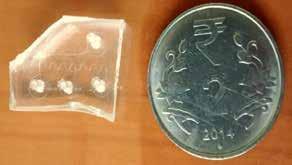
Separating plasma from cellular elements of blood is imperative in disease diagnostics. Conventionally, blood plasma is separated in a centrifuge. However, this process of separation is difficult to replicate at the microscale, requires large sample volume, and is laborious and time consuming.
In this context, we have developed a microdevice enabling blood plasma separation. The results obtained are extremely encouraging in terms of separation efficiency. Separation efficiency of almost 100% has been achieved with whole (undiluted) blood. Our microdevice avoids clogging of microchannels as the dimensions of the
microchannels were kept comparatively large. The developed microdevice has been extensively tested with human blood. Our developed microdevice yields reliable performance for several hours at a stretch without any degradation in performance. Demonstration of very high separation efficiency at extremely low cost with extremely high reliability are the primary highlights of our developed microdevice.
The developed technology is superior to existing technologies. Centrifuges are typically bound to a diagnostic lab, need trained manpower, and run on electricity. This sets a limitation on the usage of centrifuges at the point-of-care since the blood samples collected from the field need to be transported to the diagnostic lab for further
processing; the mishandling or delay often leading to sample wastage. Another disadvantage of using centrifuges is that due to the increased number of steps in sample processing the chances of contamination of the sample is higher. There are several rapid diagnostic tests available which require serum or plasma, for higher sensitivity
and specificity, but they are not truly point-of-care tests as the plasma is not available at the location of the patient.
A recently proposed alternative to centrifuge is the use membrane based filters. However, such filter papers work only on very small volumes of blood, and do not retain both the plasma and the cellular contents. The analytes of interest in blood sample can further adhere to the membrane fibers, thereby weakening their diagnostic potential. Therefore, such platforms can only support a limited category of biochemistry based diagnostic tests. Our proposed solution addresses all the shortcomings highlighted in the existing methods.
This research was funded by the Department of Science and Technology, New Delhi and Wadhwani Research Center for Bioengineering, IIT Bombay. The developed microdevice is being commercialised through a start-up, Embryyo Bio-Microdevices Pvt. Ltd. We have received funding under the prestigious Longitude Prize Discovery Award 2017 from Nesta UK to use this technology towards tackling the rising incidences of anti-microbial resistance.
Prof. Amit Agrawal
